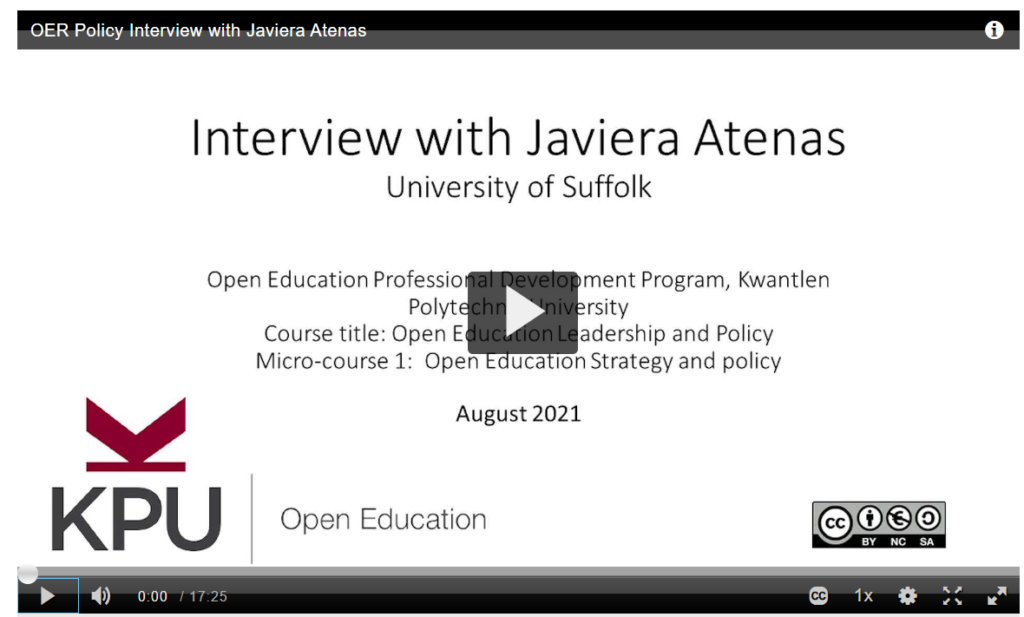6.4 BLOG & GRAPHIC | Challenges for social justice approaches
In this final assignment for OPEN 9600: Open Ed Policy and Leadership, we are asked to contribute a blog post with an accompanying graphic, image or media that express our views on the policy and leadership challenges to launching a social justice approach in complex educational contexts. We are to draw on examples from experience and support our writing with examples from course content, readings, videos, and forum discussion (forum discussion examples are noted as personal communications)
OPEN 9600 was developed by Dr. Glenda Cox and facilitated by Josie Gray. I am fortunate to learn from both leaders in the Open movement and a cohort of learners who lead open initiatives in their contexts.
My Experiences in Open Ed Policy and Leadership
My experiences in Open Education Policy and Leadership have mainly been grassroots, and awareness of them facilitated through professional development opportunities such as eCampus Ontario’s Ontario Extend program, webinars, TESS annual conferences, OTESSA, OE Global and grant support such as VLS funding by the Ontario government. I look forward to learning more about the National Advocacy Framework for Open Educational Resources in Canada at an upcoming Cross-Canada Coffee Chat (#OECCCC).
In my context, we have successfully advocated for and received support for an Open initiative to fund open educational resources (OER) development, development time, wrap-around supports, and membership in the Community College Consortium for OER (CCCOER). While not an explicit policy, many implicit signals that Open is supported. Open meets many components of the institutional strategic plan, such as student success, student focus, collaboration, inclusiveness, innovation, supporting the development of employees, and digital transformation.
Open aligns with the Principles for Responsible Management Education (PRME), of which the School of Business is a PRME champion and signatory. Atenas (2021) suggests that embedding open education in various initiatives as a component is important for the sustainability of Open because different initiatives may need a different component of what Open offers. For example, suppose we centre an open policy only on Open Educational Resources (OER) development, and people think we are only digitizing paper textbooks. In that case, we miss a whole audience who may not see the benefit of open policy for digital transformation in learning policies such as IT and education (Atenas, 2021). I suspect many will agree that with the onslaught and rapidly expanding selection of Artificial Intelligence (AI) tools now, more than ever, we need critical digital and socially just lenses (lenses that open scholars offer) involved in conversations of AI tool practices and policies.

https://media.kpu.ca/media/OER+Policy+Interview+with+Javiera+Atenas/0_mbxsapjm
Transcript Atenas, J. (2021) Interview with Javiera Atenas [Kaltura]File]
Challenges to Launching a Socially Just Approach in Complex Contexts
If you have been following my posts previously, I spoke to the equity benefits OER provides by ensuring all learners have access to free and accessible learning resources on the first day of class and that the licensing allows for perpetual use after the course ends and for sharing with others. I have met few people who didn’t think this was a good idea. There are questions about OER quality and the level of peer review. However, the main pushback aside from lack of time is the lack of ancillary resources and whole packages that publisher resources have. The “whole” package usually includes slide decks, instructor resources, homework sites and test banks.
Could structural issues such as the precarious work of adjunct faculty taking on more teaching assignments at multiple institutions led to this lack of time to create resources? (personal communication) Even if sufficient time and support are available, has it become so normative that somehow we lost our way and now rely on these pre-packed resources that are considered superior? Williams & Werth (2021) suggest that companies have been increasingly offering what in the past would have been part of the faculty role to design, develop, and select – curriculum, course content, class activities, and assessment. For example, they reference a study by (Rawn and Fox 2018) that indicated that 60% of Canadian University Faculty acknowledged that they develop presentation materials, curricula, and ancillaries for the courses that they deliver. (Williams & Werth, 2021). So, this begs the question, is it ethical to ask learners to pay for access fees to ancillary materials developed by some faculty and not others when this development is supposed to be included in their tuition?
Do Resources Shape Pedagogy?
Consider this study by (Vinden, Flinn & Carson 2021), which suggests that pedagogy is being shaped by resources in Technical and Vocational Education and Training (TVET); in this context, courses are being built through the material provided by the Industry Training Authority (ITA) or pre-packaged publisher resources, and neither is considered as a good fit for meeting the needs of students.
In this post-pandemic digital landscape, with faculty burnout reported as high as 75%, how often is the curriculum built or delivered with pre-packaged commercial course materials because it saves time? Arguably, the tech used to build these ancillary resources appears more professional than a faculty-generated explainer video. What pedagogical value is a tech-generated activity over faculty-designed instruction? I prefer to watch the certified plumber on YouTube demonstrate how to change the washer in my tap, before I try it, even if it is simple in quality. Wachter (2019) suggests that this is the time to extend beyond open licensing and place open values into the wider context of new technological development to work collaboratively with stakeholders and advise policies that include technical platforms. Fawns (2021) advocates for a collaborative approach where pedagogy and technology are entangled and collaboration between stakeholders, including students, contextualizes and unpacks the complexities.
Conclusion
Systemic problems and layers of complexity need to be mitigated if higher-ed is to benefit from Open Educational Practices (OEP), of which Open Educational Resources (OER) are just one. Relying on short-term funding will not sustain OPEN long-term. I agree with Atenas (2021) embedding OPEN principles into existing policies is more sustainable than a stand-alone policy that no one takes ownership of. A plan must be in place to clarify the layers of complexity and chances for misinterpretation. This means advocacy for open values at many levels of many organizations, critical examination of current practices, and support and facilitation of Open Educational Practices (OEP) and the pedagogies that underpin them. National frameworks may be helpful but are likely only one part of a strategic and necessary multi-prong approach. In my view, Open Educational Practices are necessary to ensure that we have a socially just digital transformation.
References:
Atenas, J. (2021) OER Policy Interview with Javiera Atenas. KPU Open Education [YouTube Video]
Fawns, T., (2022) An Entangled Pedagogy: Looking Beyond the Pedagogy – Technology Dichotomy. Retrieved from Post digital Science and Education. https://link.springer.com/article/10.1007/s42438-022-00302-7
Vinden, S., Flinn, C., Carson, T.S. (2021), Strengthening Digital Teaching and Learning for Trades, Vocational, Education and Training Practitioners. https://bccampus.ca/2021/05/12/strengthening-digital-teaching-learning-for-trades-vocational-education-and-training-practitioners/
Watcher, N. (2019, May 1). When Open Educational Resources and platform capitalism meet. Discover Society. https://archive.discoversociety.org/2019/05/01/when-open-educational-resources-and-platform-capitalism-meet/
Williams, K., & Werth, E. (2021). A Case Study in Mitigating COVID-19 Inequities through Free Textbook Implementation in the U.S. (1). https://doi.org/10.5334/jime.650
This post is licensed CC-BY-NC-SA unless otherwise indicated
